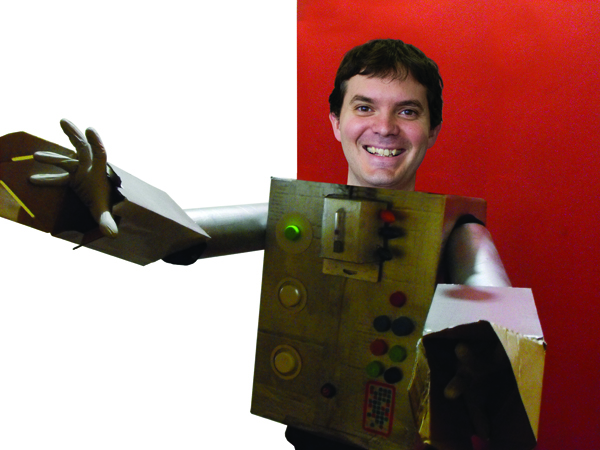 My dad made a robot costume for me when I was in first grade. I waited until the last minute to make my choice known, leaving him precious little time to convert found paper rolls, cardboard boxes and tinfoil into a robot. Despite my dad’s industriousness, the costume had some engineering flaws. My mom recalls seeing me lagging behind in the school parade. As my classmates marched down the street, I was trying to hold my costume together and walk with knees trapped in unbending tubes.
My dad made a robot costume for me when I was in first grade. I waited until the last minute to make my choice known, leaving him precious little time to convert found paper rolls, cardboard boxes and tinfoil into a robot. Despite my dad’s industriousness, the costume had some engineering flaws. My mom recalls seeing me lagging behind in the school parade. As my classmates marched down the street, I was trying to hold my costume together and walk with knees trapped in unbending tubes.
Some might wonder how costume-making (p. 15) fits into the world of sustainability and the pages of Grid. After all, how significant would the net impact be even if everyone in Philadelphia made their own Halloween costumes?
In a recent issue of the New Yorker, the highly respected environmental writer Elizabeth Kolbert dismisses No Impact Man (p. 28)—the Manhattanite who, with his family, spent a year trying to eliminate his carbon footprint—as a gimmick. Real change would be better achieved, she concludes, if he used a little carbon for a train ride to Albany, where the New York state government makes decisions.
I can’t argue with her central themes. Bloggers like No Impact Man are clearly self-promoters, creating artificial challenges and documenting them in the hopes of finding some fame, and maybe a book deal. And without good public policy, our individual efforts will not amount to enough.
However, these “stunt” books question our assumptions about everyday life, and display how resourceful and self-reliant people can be when they start asking root-level questions. Doesn’t it stand to reason that when people consider their actions on a daily basis, they become more aware of what society does on a larger scale? Are personal epiphanies and public policy mutually exclusive?
If mindfulness devolves into self-satisfied navel-gazing, then they might be. But when Ray Anderson (p. 8), the CEO of Interface Inc., had his own epiphany, he took sustainability to a much larger, industrial scale. Is it not possible that individual epiphanies are precisely what lead to a change in business and government?
After his yearlong experiment ended, No Impact Man offered this advice to people who were wondering what to do to make a difference: join an environmental group. That sounds like good advice, especially when you see the joy (and sense of purpose) on the face of everyone affiliated with the Senior Environmental Corps (p. 18), or the determination in the eyes of the people at 350.org (p. 9). Because, just maybe, it’s the enlightened individual who seeks others in a community that ultimately makes change possible.
Alex J. Mulcahy
Publisher
alex@gridphilly.com

